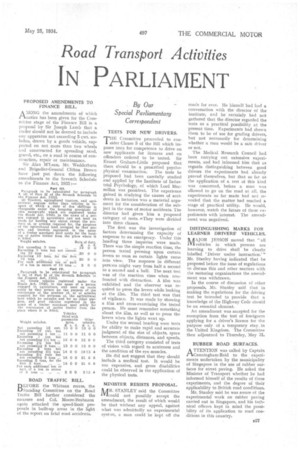• By Our Special Parliamentary Correspondent
Page 45

If you've noticed an error in this article please click here to report it so we can fix it.
TESTS FOR NEW DRIVERS.
THE Committee proceeded to consider Clause 5 of the Bill which imposes tests for competence to drive on new applicants for licences and on offenders ordered to be tested. Sir Ernest Graham-Little proposed that there should be a prescribed psycho
physical examination. The tests he proposed had been carefully studied and applied by the Institute of Industrial Psychology, of which Lord Macmillan was president. The experience gained in studying the causes of accidents in factories was a material argument for the consideration of the subject in the case of motor accidents. The director had given him a proposed category of tests. P.They were divided into three classes.
The first was the investigation of factors determining the capacity of response to an emergency, Under this heading three inquiries were made. There was the simple reaction time, the person tested pressing upon certain levers so soon as certain lights came into view. The response in different pers.ms might vary from half a second to a second and a half. The next test was of the reaction time when confronted with distraction. A film was exhibited and the observer was required to press the levers while looking at the film. The third test was that of vigilance. It was made by showing a film and cross-examining the tested person. He must remember something about the film, as well as to press the levers when the lights went up.
Under the second heading were tests for ability to make rapid and accurate judgment of the size of objects, space between objects, distances, and speeds.
The third category consisted of tests of vision with regard to acuteness and the condition of the eye muscles.
He did not suggest that they should include a medical test. It would be too expensive, and gross disabilities could be observed in the application of the physical tests.
• MINISTER RESISTS PROPOSAL.
MR. STANLEY said the Committee could not possibly accept the amendment, the result of which would be that without any appeal, against what was admittedly an experimental system, a man could be kept off the




































































































